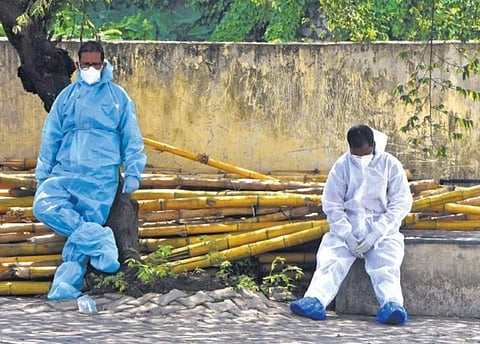

KOCHI: After enduring more than a year-long trauma inflicted by the pandemic, hundreds of healthcare workers are feeling the heat as the second wave continues to batter the state. Experts have already warned of yet another wave in the immediate future, heightening the anxiety, depression, insomnia and post-traumatic stress disorder among frontline workers fighting the pandemic.
According to officials of Kerala State Mental Health Authority (KSMHA), ever since the second wave started, healthcare workers are experiencing a slew of stress-related issues. It is learnt that around 25% to 50% of them require help. The authority is getting umpteen calls from the healthcare staff relating to extreme stress, insomnia, panic attacks and anxiety issues. The health workers are seeking help for their anxieties which mainly surround the vaccination of their families and the unending struggle they are facing to handle both professional and personal lives.
Worried about family’s vaccination
“I lost my mother to Covid-19. There is a huge risk involved in this work. We work in an extremely contaminated environment and our family members are not vaccinated yet. We go back home every day to our family and we may be asymptomatic and can be carrying the virus with us. There is a high chance that we may infect our family members,” said a healthcare worker who didn’t want to reveal his identity.
Though the Kerala Government Medical Officers Association (KGMOA) has demanded the government to give priority vaccination to the family members of the frontline workers, it hasn’t happened yet as the state is reeling under an acute vaccination shortage.
According to officials of Kerala State Mental Health Authority, a majority of the calls it receives are about sleep-related issues. In an effort to give psychosocial support to frontline workers, the state government has launched dedicated helpline numbers for them. Amid the raging second wave, the authority has also launched stress management classes for the staff including paramedical staff, doctors, nurses, lab technicians etc. The government has roped in 1,126 mental health personnel including psychiatrists, psychiatric social workers, clinical psychologists and counsellors to provide support to Covid patients and healthcare workers. It is learnt that the psychosocial team has made around 64,000 calls to healthcare workers till date.
“Medical professionals and a section of healthcare workers are hesitant to seek help. Many are experiencing chronic stress and we are getting a lot of calls from frontline workers and we are trying to reach out to them. It’s worse for those already having underlying issues like anxiety and depression. Many of them are worried about their family members, especially their vaccination. Other issues are generally related to their children. Many healthcare professionals are unable to pay attention to their children the way they want to. Schools are yet to reopen and they are struggling to balance work and personal lives,” said an official of the authority.
He said sleep-related issues are becoming more common among healthcare workers. “We have given recommendations to manage stress among healthcare workers. It’s a pandemic and following these recommendations wouldn’t be easy,” the official said. Buddy systems and forming small groups at the institutions are among the many government recommendations to manage stress among healthcare workers.
Buddy system
Less experienced personnel are grouped with an experienced one as a buddy. It helps provide support, monitor stress and reinforce safety procedures. It also helps improve skills in the less experienced persons. Doctors, nurses, paramedical staff and other government staff who have less workload at present can be deployed in this manner.
Ease workload by standardising staff pattern
Many feel that one of the primary causes for increased stress and other issues among healthcare workers is the human resource crunch. “It’s high time the state government brought in some standardisation in the patient-staff ratio. It’s unfair to increase the number of beds without giving adequate staff and other logistics. The healthcare workers are overburdened and when the government plans to increase the infrastructure, it should be done in a holistic manner. We believe a lot of stress on healthcare workers would be relieved if a proper standard is fixed,” said Deputy Superintendent Santhosh Kumar S S, Emergency Medicine, Thiruvananthapuram Medical College Hospital.
A lot of healthcare professionals and junior doctors in the private sector are also facing a slew of issues. According to Aparna Viswanathan, founder of Zocio -- an organisation working in the social-emotional learning space -- her organisation is getting a slew of calls from frontline workers. “We get calls from doctors, junior doctors and freshers who have been roped in for duty to fight the pandemic. Many of them are not mentally or emotionally prepared to handle something of this scale and they are witnessing helplessness and deaths everyday. They are unable to sleep at night and seek help from us. The hard part is we are able to offer the solution only via phone calls,” said Aparna.
She said there should be a process-driven approach to help those in need in the health sector. “There needs to be someone to listen so that these personnel can vent their feelings. Buddy systems and forming groups at institutions are options. Also, there need to be awareness programmes to encourage the staff to extend help and get help,” she added.